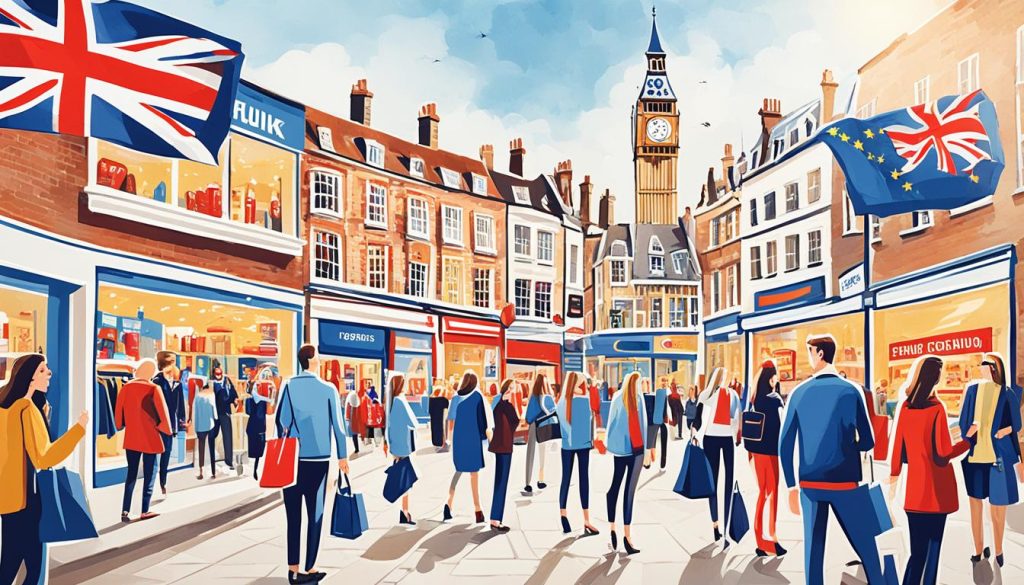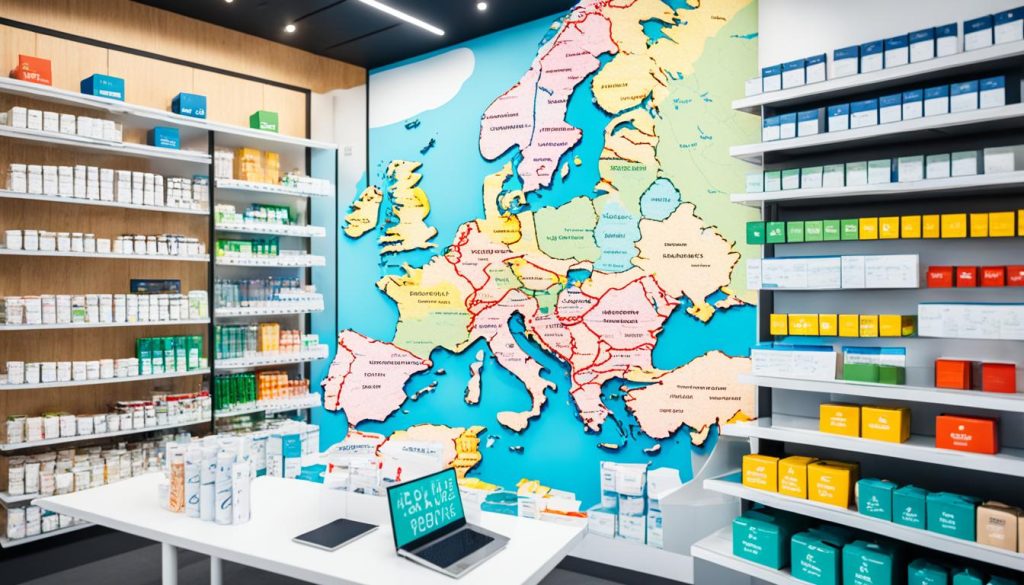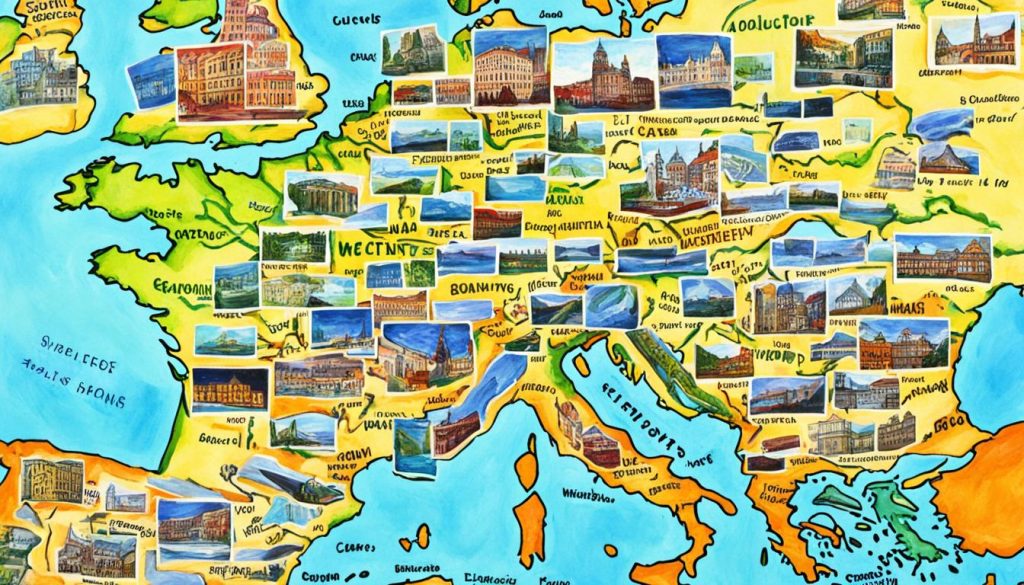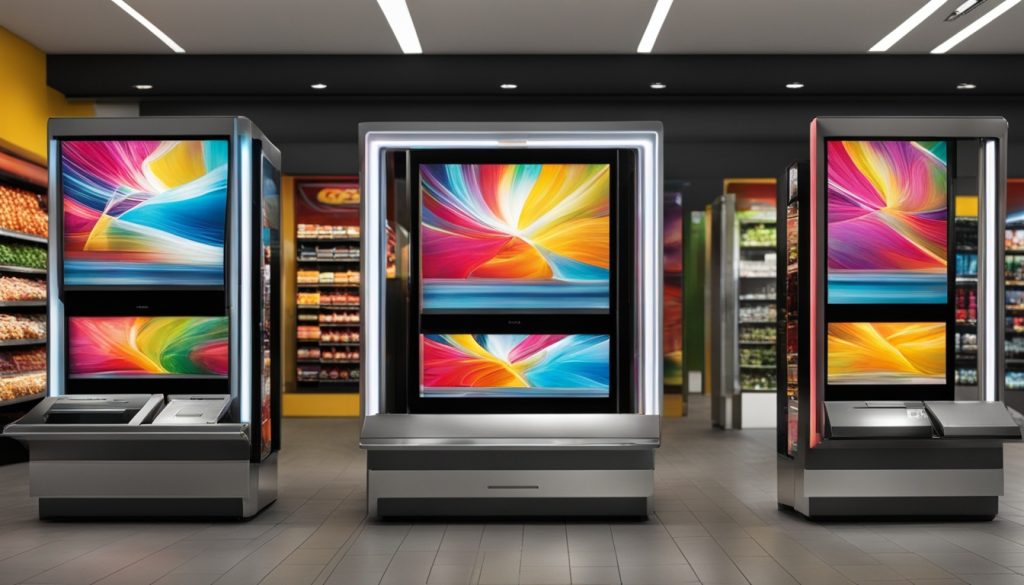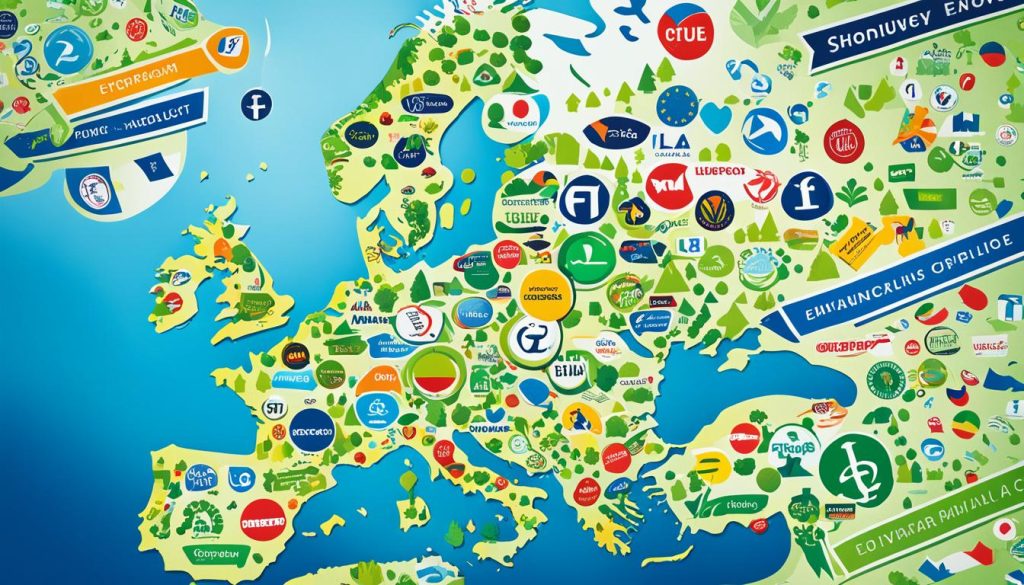Did you know Europe’s retail sector is expected to hit €4.5 trillion by 2025? This incredible projection shows why more international retailers eye Europe for expansion. With many different customers and well-developed markets, Europe is a prime spot for retail businesses aiming to grow, strengthen their brand, and make their products more popular.
By setting up shop in Europe, retailers gain lots. They achieve better brand visibility, engage more deeply with customers, and learn more about local shopping habits. As the world of retail leans more towards international business, using online success to open real stores in Europe is a smart move. It brings more profits and customer loyalty.
Key Takeaways
- Europe’s retail sector is projected to reach €4.5 trillion by 2025.
- European retail expansion offers vast opportunities in a mature market.
- A physical presence enhances brand visibility and customer engagement.
- Retail market entry into Europe provides invaluable local consumer insights.
- Transitioning from e-commerce to brick-and-mortar stores can boost profitability.
Introduction to Expanding Retail Ventures into Europe
The European retail market attracts global brands. It offers a large consumer base and a strong e-commerce system. This makes Europe a great place for setting up shops. Businesses see this as a chance to grow and make their brands well-known.
The Current Landscape of European Retail
The retail sector in Europe is thriving and changing. Online shopping and physical stores work together to enhance shopping experiences. Companies are using this change to reach more customers. They mix digital and in-store methods to succeed in Europe.
Why Europe is Attractive for Retail Expansion
There are many reasons to grow retail in Europe. The continent has a strong shopping culture and loves global brands. This creates perfect opportunities for new shops. Being there in person also helps companies get closer to local people. They can quickly adapt to what people want.
Benefits of Physical Stores in New Markets
Opening physical stores in new European markets brings many benefits. These include building a strong brand presence. By meeting customers face-to-face, shops can boost their engagement and offer better experiences.
This interaction helps shops understand what customers like and need. It strengthens customer relationships too.
Physical stores also provide valuable insights into the market. Shops can learn directly from customers, improving their strategies and products. This knowledge helps create marketing campaigns and products that locals love.
Moreover, a physical store increases brand recognition. It helps the brand become a local community member. This builds a stronger bond with customers.
People often trust brands they can interact with directly. Activities and promotions in the store, along with great service, enhance this trust. This creates satisfied and loyal customers.
To sum up, physical stores in new European markets offer big advantages. These include a better brand image, more engaged customers, and vital market insights. Together, they help retail businesses in Europe succeed and grow, giving them an edge and ensuring their longevity.
Understanding Local Regulations and Compliance
When planning to expand retail into Europe, knowing and following regulatory compliance is key. Retailers need to understand all consumer protection standards and employment regulations. This avoids legal problems. It’s vital to research thoroughly to open a successful store.
Researching Local Regulations and Legal Requirements
Every European country has its own rules that businesses must obey. This means looking into laws at national, regional, and local levels. Retailers need to know about consumer protection, zoning laws, and health and safety rules for their market.
Essential Compliance Obligations: Consumer Protection and Employment Laws
For smooth operations, focusing on key areas like consumer protection standards is essential. These ensure product safety and fairness. Also, following employment regulations is critical for a legal and positive workplace. This promotes employee rights and good relationships. Careful compliance is necessary for lawful and successful European ventures.
Choosing the Right Business Structure for Europe
When looking to grow in European markets, it’s key to pick the right business form. A European subsidiary might be the best choice. It allows full control and might offer tax perks because of local tax treaties. On the other hand, going for a franchise model helps with fast market entry. It does so by sharing tasks with local partners and builds on the brand’s existing reputation.
It’s crucial to understand what each business form means. Subsidiaries require sticking to local laws closely but give more control over the business. Franchises, though, can start quicker and carry less risk. Still, the legal duties are different and need careful study of the laws in each area.
There are other options too, like branches. These are easier to set up but could lead to more complex operations and watching by regulators. So, think about taxation, how you’ll govern, and the commercial laws when choosing how to expand in Europe.
Choosing right means your business strategy fits with what Europe needs. Subsidiaries and franchises each offer something special. This choice will show in your company’s long-term vision, how you use resources, and your plans to enter the market.
- European Subsidiary: Full control, benefits from local tax laws, comprehensive compliance obligations.
- Franchise Models: Shared responsibility, rapid market entry, local partner expertise.
- Branches: Simplified setup, complex operations, high regulatory watchfulness.
Navigating Retail Licensing in Europe
Expanding into European markets means understanding complicated retail licensing rules. Each country has different requirements. Knowing how to deal with this complexity is key to success.
Understanding Jurisdictional Differences in Retail Licensing
Retail licensing varies widely across Europe. Each country has its own rules. It’s vital for companies to get to grips with these differences.
Grasping each region’s legal framework helps businesses stick to the law. This avoids legal problems.
Best Practices for Securing Retail Permits
Making it in the European retail world involves smart permit strategies. Working with local experts and legal advisors is crucial.
They give critical advice on permits, ensuring you meet all rules. This helps companies enter new markets more easily.
Importance of Local Expertise
Expanding into new European markets comes with its challenges. It’s crucial to understand the complexities involved. This is where local formation experts, lawyers, and accountants become vital. They have the specialised knowledge needed. Their experience helps businesses navigate through the maze of regulations and rules. This ensures a successful start in the European retail world.
Utilising Local Formation Experts
When you’re moving your business to a new country, local formation experts are key. They know exactly what you need for a successful launch in Europe. These experts help with business registration, compliance with local laws, and more. They make the complex processes simpler for foreign businesses. Their understanding of the local business scene speeds up market entry.
The Role of Local Lawyers and Accountants
Local lawyers and accountants are critical in setting up your business in Europe. Lawyers handle legal documents and contracts, protecting your business. Accountants, on the other hand, provide important financial advice. They help you grasp local taxation and financial rules. These professionals ensure your business meets all legal and financial requirements. They pave the way for your growth and success in the new market.
Localising Your Marketing and Product Offerings
Entering the European market requires careful cultural adaptation in your marketing and products. Every European country has its own traditions and ways of buying. It’s vital to adjust your brand and messages to fit these differences.
Understanding local consumer trends is the first step. For example, what British buyers like might not match German preferences. Knowing these trends helps target your marketing better.
Changing your brand messaging to match local tastes is key. You might need to tweak your ads and materials. This could mean changing your language, using local symbols, or even humor.
Your products should also appeal to local buyers. This might mean altering what you already offer or creating new items. Paying attention to local consumer trends guides these changes. Products that reflect local tastes can build loyalty and success.
In summary, cultural adaptation and focusing on local consumer trends are essential for success in Europe. By adjusting your brand messaging and products, you can grow and maintain customer loyalty.
Optimising Logistics and Supply Chain Management
Effective logistics and supply chain management are key for retailers entering the European market. They can boost supply chain efficiency by using local strategies. This ensures operations run smoothly and customers are happy.
Integrating Local Warehousing Solutions
Adding local warehousing to a retailer’s plan greatly improves supply chain efficiency. European countries have different warehousing options. This helps businesses keep their stock close to important markets.
Forming Partnerships with Regional Logistics Companies
Teaming up with local logistics firms is vital for better supply chain management. These companies know the local transport networks well. They provide custom solutions that speed up deliveries and cut costs.
- Enhanced delivery speed through local warehousing
- Cost reduction via optimised logistics partnerships
- Improved customer satisfaction due to efficient supply chain management
Using these methods ensures products are always available and simplifies logistics. It helps retail businesses grow successfully in Europe.
Implementing Advanced Electronic Point of Sale (EPOS) Systems
In today’s market, using advanced EPOS tech is key for better efficiency worldwide. These systems give retailers tools to make processes smoother and boost customer satisfaction.
Benefits of EPOS Systems in International Retail
EPOS systems bring many benefits to global retailers. They help businesses handle transactions smoothly and with precision. Also, these systems help manage inventory well, making sure stocks meet customer needs quickly.
- Faster, more secure transaction processing
- Improved inventory management through real-time data
- Enhanced customer satisfaction with reduced checkout times
Real-Time Tracking and Data Collection
Modern EPOS systems can track and collect data instantly. This feature lets retailers keep an eye on inventory, sales, and what customers like, all in real-time.
- Real-time inventory tracking helps prevent stockouts and overstocks
- Access to detailed sales analytics enables data-driven decisions
- Instantaneous data collection provides insights into consumer behaviour
By using EPOS tech, retail businesses can make their operations smoother and gain important insights. This leads to better inventory management and sales analysis. It helps businesses do well in the global market.
Adapting Merchant Services and Payment Methods
Adapting merchant services to suit local consumer payment preferences is key for retailers going into new markets. Integrating payment gateways is crucial. It gives smooth and reliable transaction options. This includes local credit cards and new mobile payment solutions.
Keeping up with the latest digital transaction systems is vital. It helps meet customer expectations. By offering many payment methods, retailers make paying easy. This boosts customer loyalty and increases repeat business. Options like PayPal, Apple Pay, or the UK’s Faster Payments should match what customers prefer.
An effective payment gateway integration does more than meet consumer preferences. It also boosts security and speeds up processing. Retailers looking to grow in new areas must choose flexible and reliable digital systems. This strategy meets local needs and keeps the business competitive. Especially in a fast-changing digital world.
- Offer various payment methods including mobile payments and local credit cards
- Ensure strong payment gateway integration for smooth transactions
- Update with new digital transaction systems to stay ahead
The Role of Cultural Training in Retail Expansion
For retail businesses keen on European markets, cultural training is key to success. Teaching staff to understand regional differences is critical. This knowledge ensures smooth operations and positive work settings.
Equipping Staff with Local Cultural Knowledge
Cultural training programs are vital for staff. They teach about local language, social ways, and customs. This training helps staff connect with local shoppers, boosting satisfaction and loyalty.
Impact on Staff Retention and Recruitment
Knowing about culture affects hiring and keeping staff in retail. A workplace that welcomes all cultures draws more applicants. It also keeps staff happy, which is essential for keeping a strong team. This approach improves the retailer’s image, making it a top choice for work in new areas.
Case Studies: Successful Retail Expansions in Europe
Looking into successful retail expansions gives us great ideas for breaking into Europe. The experiences of these companies give clear tips for up-and-coming shops. Let’s talk about Uniqlo first. They made a big splash in Europe by matching their products with what locals like. They chose their store locations carefully. This smart move helped them become popular and widely accepted.
Nike’s journey into Europe is another brilliant story. They got to know the local sports scene very well. This knowledge helped them fit in smoothly across many European countries. By matching their offerings with what locals want, Nike grew fast. They also built a strong circle of loyal buyers.
Sephora’s move into Europe is also worth noting. They brought new ideas on how to sell beauty products. Their stores offered unique shopping experiences that really stood out. This approach won over many customers in a new market for them.
- Uniqlo: Enhanced market penetration through localisation and strategic store placements.
- Nike: Leveraged local consumer behaviours for market success.
- Sephora: Utilised experiential retail to engage European consumers effectively.
These stories show different ways to succeed in the European market. From localisation to engaging shoppers, each story offers valuable lessons. Understanding and applying these strategies can greatly improve your chances of doing well in Europe.
Challenges and Considerations in European Physical Retail Ventures
Entering European markets brings unique challenges for retailers. It’s key to overcome these to set up a lasting store in Europe. Businesses must tackle market entry hurdles with care.
Common Obstacles Faced by Expanding Retailers
Retailers face several hurdles when expanding. They deal with strict regulations requiring them to know and follow local laws. They must also adapt to different cultures to match European consumers’ likes. Plus, there’s stiff competition from local and global brands seeking the same customers.
Strategies for Overcoming Expansion Challenges
Retailers can beat these challenges with smart strategies. This includes:
- Market Research: Learning deeply about local shoppers’ habits and wants.
- Regulatory Compliance: Following local laws closely to avoid legal trouble.
- Cultural Adaptation: Changing products and ads to fit local cultures.
- Risk Management: Planning well to reduce the risks of expanding.
- Local Partnerships: Teaming up with local companies for better insights and strategies.
By actively solving these issues and planning cleverly, retailers can lay a firm foundation in Europe. This way, they cut down risks and boost their chances of growing in new areas.
Partnering with Experts for Seamless Expansion
Expanding into European markets can seem tough. To ease this, working with market entry experts is crucial. They guide you at every step of the way.
Talking to international retail advisors gives you custom advice for new markets. They know all about local laws and how to better your business. This advice helps shops move smoothly into new areas.
These experts help with setting up your company, analysing the market, and starting operations. Their full support makes expanding easier. It lets business owners concentrate on growing successfully in Europe.
By using market entry consultancy and retail advisors, shops get stronger in Europe. This makes expanding there less daunting and more rewarding.
Future Trends in Retail Expansion Across Europe
Europe’s retail sector is changing fast thanks to new tech, shifts in consumer habits, and changing economies. To succeed in Europe, retailers need to keep up with these trends. Tech innovations and new retail tech are big game changers, making things run smoother and improving how customers shop.
Artificial intelligence and machine learning are now key in retail. They help predict what customers like and manage stock better. Plus, augmented reality and virtual reality are changing shopping into something more fun and immersive, letting customers interact with products in new ways.
Changes in what shoppers want are also important. Folks in Europe are now into sustainability and ethical shopping. Retailers need to be eco-friendly and ethical to win them over. Also, as online shopping grows, stores must blend in-store and online shopping seamlessly.
The economic climate in Europe is still always changing. Retailers must stay alert about trade rules and the market. By getting into these retail trends and being flexible, companies can grow in Europe. This way, they’ll make the most of their business in this varied and lively market.
Source Links
- https://www.openaeuropeancompany.com/blog/starting-physical-retail-ventures-in-another-european-country/
- https://www.euractiv.com/section/economy-jobs/news/investing-in-europes-future-how-private-equity-and-venture-capital-is-building-european-resilience/
- https://www.indexventures.com/destination-europe/

